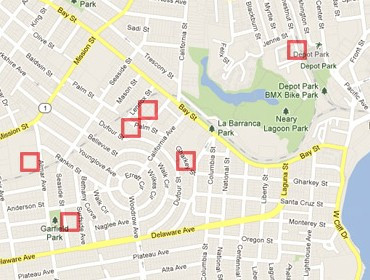London Police to Adopt Crime-Predicting Computer Package

Police in Britain's biggest force are to use computers to help them predict the crime hotspots of the future and divert resources to areas at high risk.
Developed in the United States, the PredPol program allows police to feed in crime data, from which it calculates and highlights 250-yard zones at particular risk.
So-called predictive policing has helped police in the US drive down rates for crimes such as burglary by as much as 17% in some areas, and trials in the UK have already proved similarly successful.
Forces in Greater Manchester, Kent, the West Midlands and West Yorkshire that trialled the software have reported encouraging results. In Trafford, a borough of Manchester, police using the software witnessed a drop in burglary rates of 26% between May 2010 and May 2011, compared with a 9% reduction across the city as a whole.
Now the Metropolitan Police in London is to use the technology, with police commissioner Sir Bernard Hogan-Howe reportedly strongly supportive of the scheme.
Academics at UCL are currently researching predictive policing models, and have consulted with police on PredPol.
Prof Shane Johnson at UCL's department for security and crime science and his team are working to identify which data might best refine predictions. He said that information on how well connected an area was to a transport route or information on the weather could help to pinpoint locations even more precisely. He also said that interviews with criminals showed similarities between their behaviour and that of foraging animals, with both abandoning areas they had exhausted and where their presence was well known.

"The risk of crime is higher in some places than others but does not occur in even the riskiest areas all the time, and sometimes occurs in low-risk neighbourhoods.
"The challenge of predicting when crimes will occur at particular locations is the aim of predictive policing. It's no longer possible to throw overtime at problems. The police have got to work a bit smarter," Professor Johnson told the Sunday Times.
The College of Policing, which sets professional standards for Britain's force, supports the roll-out of the scheme, with its backers saying it could prove vital as a way of focusing police resources at a time when some forces face budget cuts of as much as 20% as a result of government austerity measures.
In the US, a number of other predictive policing measures are currently being researched, including CCTV sensors that are able to recognise the expressions of those acting suspiciously, and squad cars directed by computers that predict the most useful patrol route.
However, some have warned that software like PredPol could lead to police resources being allocated to more affluent areas, and that identifying probable crimes does nothing to address the underlying causes of crime.
"A report-based systems may favour rich neighbourhoods which turn to the police more readily rather than poor ones where crime is rife. Crimes such as burglary and car theft are more consistently reported than drug dealing or gang-related violence," notes the Economist.
© Copyright IBTimes 2025. All rights reserved.




















